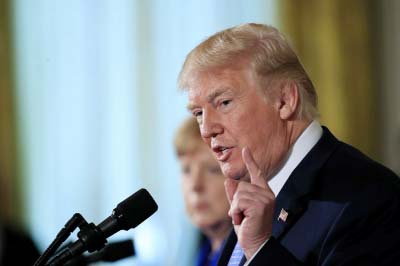
AP, Washington :
President Donald Trump is claiming credit for a historic inter-Korean summit, but now faces a burden in helping turn the Korean leaders’ bold but vague vision for peace into reality after more than six decades of hostility.
Trump must contend with two nagging suspicions: first about his own suitability to conduct that kind of war-and-peace negotiation and succeed where his predecessors have failed; secondly, whether North Korean leader Kim Jong Un really is willing to give up the nuclear weapons his nation took decades acquiring.
“It is still unclear whether North Korea still believes that it can have its cake and eat it too,” said Victor Cha, who until January had been in the running to become Trump’s choice for ambassador to South Korea. Cha said that while the atmospherics of the inter-Korean summit got an “A” grade, the meeting had failed to clarify whether Kim is willing to give up his nukes or is interested in just freezing his programs in return for sanctions relief and economic and energy assistance.
At a White House news conference with German Chancellor Angela Merkel on Friday, Trump basked in the afterglow of the feel-good meeting between Kim and South Korean President Moon Jae-in, and said he has a responsibility to try to achieve peace and denuclearization.
“And if I can’t do it, it’ll be a very tough time for a lot of countries, and a lot of people. It’s certainly something that I hope I can do for the world,” he said.
While Moon and Kim pledged to seek a formal end to the Korean War by year’s end and to rid their peninsula of nuclear weapons, they didn’t specify how it would be achieved. And now the pressure to deliver results, at least on the allies’ side, has shifted to Trump.
“There will be a suggestion that the South Koreans have teed it up very well for him and he’s not going to have the option of walking away in a huff,” said Christopher Hill, who was the lead U.S. negotiator with North Korea under the George W. Bush administration.
Trump left little doubt the unprecedented U.S.-North summit, tentatively scheduled for May or early June, would go ahead. He said he was looking forward to the meeting and that it “should be quite something.” The U.S. had narrowed down the choice of summit venue to two locations he didn’t name.
The president pushed back against critics that say he’s being manipulated by Kim, who has abruptly shifted to diplomacy after last year’s full-scale push to become a nuclear power that could threaten the U.S. mainland.
“I don’t think he’s ever had this enthusiasm for somebody, for them wanting to make a deal,” Trump said in the Oval Office. “We’re not going to be played, OK. We’re going to hopefully make a deal.
President Donald Trump is claiming credit for a historic inter-Korean summit, but now faces a burden in helping turn the Korean leaders’ bold but vague vision for peace into reality after more than six decades of hostility.
Trump must contend with two nagging suspicions: first about his own suitability to conduct that kind of war-and-peace negotiation and succeed where his predecessors have failed; secondly, whether North Korean leader Kim Jong Un really is willing to give up the nuclear weapons his nation took decades acquiring.
“It is still unclear whether North Korea still believes that it can have its cake and eat it too,” said Victor Cha, who until January had been in the running to become Trump’s choice for ambassador to South Korea. Cha said that while the atmospherics of the inter-Korean summit got an “A” grade, the meeting had failed to clarify whether Kim is willing to give up his nukes or is interested in just freezing his programs in return for sanctions relief and economic and energy assistance.
At a White House news conference with German Chancellor Angela Merkel on Friday, Trump basked in the afterglow of the feel-good meeting between Kim and South Korean President Moon Jae-in, and said he has a responsibility to try to achieve peace and denuclearization.
“And if I can’t do it, it’ll be a very tough time for a lot of countries, and a lot of people. It’s certainly something that I hope I can do for the world,” he said.
While Moon and Kim pledged to seek a formal end to the Korean War by year’s end and to rid their peninsula of nuclear weapons, they didn’t specify how it would be achieved. And now the pressure to deliver results, at least on the allies’ side, has shifted to Trump.
“There will be a suggestion that the South Koreans have teed it up very well for him and he’s not going to have the option of walking away in a huff,” said Christopher Hill, who was the lead U.S. negotiator with North Korea under the George W. Bush administration.
Trump left little doubt the unprecedented U.S.-North summit, tentatively scheduled for May or early June, would go ahead. He said he was looking forward to the meeting and that it “should be quite something.” The U.S. had narrowed down the choice of summit venue to two locations he didn’t name.
The president pushed back against critics that say he’s being manipulated by Kim, who has abruptly shifted to diplomacy after last year’s full-scale push to become a nuclear power that could threaten the U.S. mainland.
“I don’t think he’s ever had this enthusiasm for somebody, for them wanting to make a deal,” Trump said in the Oval Office. “We’re not going to be played, OK. We’re going to hopefully make a deal.

